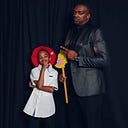I Want My Promised Land
Sitting back and reflecting on the current state of our the nation that I deeply love, I find myself in a peculiar state of mind. As a black man who is 37 years old, I find myself living in times that my ancestors would not have dreamed of; times far away from the cruelty of slavery, Jim Crow, and segregation. I live in a time where someone with the same skin complexion as mine, sits in the highest office in the land, and where I head a business that the majority of it’s patrons do not have my same skin complexion. I also lead a church where 60% of those who attend look nothing like me. I am living in times and opportunities that my grandfather marched to allow me to have. Yet, I find myself still looking around and realizing that as a nation we haven’t yet made it to our Promise Land.
Forty seven years ago, Dr. Martin Luther King gave what would be the last speech he would ever grace us with. It would actually be his eulogy of sorts. In the final part of his speech, he utters the words, “I just want to do God’s will. And He’s allowed me to go up to the mountain. And I’ve looked over. And I’ve seen the Promised Land. I may not get there with you. But I want you to know tonight, that we, as a people, will get to the promised land”! If Dr. King was still alive today, I would ask him, “Sir, why haven’t we entered the Promise Land as yet?”. I know some reading this are probably thinking that I am lunatic to say that American has not reached the “Promise Land” when it comes to racial reconciliation, but before you write me off as another black man not “satisfied” with anything, please hear me out.
I observe our country when it comes to the issue of race and it seems to parallel a lot with the Israelites in the Old Testament. For years we were in bondage of slavery. God raised up a Moses type of man in Dr. King, who would be the mouthpiece of God, to lead us out of slavery and into the Promised Land. Just like Moses, he faced the Pharaohs of injustice of his day. He led a people through the Red Sea and we watched the Egyptian army of Jim Crow buried underneath it. Yet, once our Moses passed on, we have wandered in the desert of what’s next. Though we are no longer in Egypt in slavery, we are still on the other side of the Jordan River. I am pretty sure when Dr. King went to the mountain top, this was not the Promised Land he saw for us. I believe he saw a place where people weren’t judged by the color of their skin, but the content of their character. A place where when injustice happened, it wouldn’t be a “black issue” but an American issue. A land where the local church, which should be the beacon of light for the land, would be the model of reconciliation, instead of what it currently is; a place that still hosts the most segregated event of the week, a place where black lives mattered when it comes to the unborn, a place where when a young black man “made it,” it would be the norm instead of an anomaly.
It should also be a place where our neighborhood schools and workplaces were more diverse. Where people of all different walks really did life together. I believe that that Promised Land is still out there for us to walk in, but we are in need of a generation of Joshuas. A generation of men and woman who are willing to not lead from the mountaintop of political rhetoric, but in the valley of real life. Men who are willing to model reconciliation in their homes, churches, and places of influence, no matter what their skin tone may be. A generation that is willing to drive the conversation at the dinner table with their children, spouses, and friends. A generation that will run to the needs of dying children in Chicago because we realize they could be future world changers. A generation of black leaders willing to help meet needs in communities that are not their own. A generation of Pastors who would be willing to lead the charge, no matter how much it will affect attendance and giving. I want my Promised Land. I will fight for my Promised Land. I will lead people into the Promised Land. I will do this not because I am black, but because I am man who stands on the shoulders of great men and woman who went before me. It is my job, it is our job, to see Dr. King’s dream become a reality.
